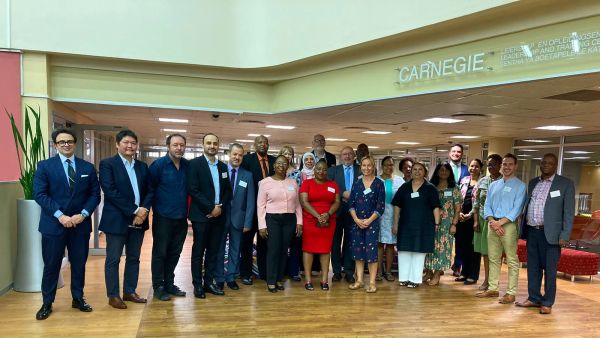DIFI Partners With Un and International Organizations To Address Family Wellbeing in Africa

The impact of socio-economic and demographic transformation in Africa and its effect on family wellbeing were topics of discussion at an event organized by the Doha International Family Institute (DIFI) in preparation of the 30th anniversary of the International Year of the Family in 2024 (IYF+30).
The three-day Expert Group Meeting (EGM), held in Pretoria, South Africa, in partnership with the University of Pretoria, the United Nations (UN) Department of Economic and Social Affairs (DESA) and the International Federation for Family Development (IFFD) under the theme ‘Demographic Changes and Family Wellbeing in Africa’, saw expert discussions around the impact of demographic changes on family wellbeing in Africa.
They also addressed the major family formation trends in Africa and how these changes affected family wellbeing, the role of technology in these changes and its impact on digital parenting, the challenges and opportunities presented by social protection policy frameworks towards supporting elderly care in the region, the interlinkages between demographic trends, migration and urbanization in contemporary Africa, and the major lessons learned in developing and implementing national and regional family policies.
Dr. Sharifa Noaman Al-Emadi, Executive Director of DIFI, highlighted the importance of focusing on family wellbeing through a comprehensive approach, which DIFI, a member of Qatar Foundation, is tackling through policy-research and mobilization.
She emphasized the importance of focusing on family wellbeing with holistic approaches, stressing that DIFI works to enhance family wellbeing and supports the making and development of policies related to research, scientific evidence, and multiple advocacy efforts. She also noted that demographic changes, accompanied by the shrinkage of traditional interactions between nuclear and extended families because of urbanization and the fragility of related policies, as well as declining fertility rates and other demographic challenges, mean structural treatments and policy and program support is required based on knowledge basis.
Speaking about the preparations for the IYF+30, Renata Kaczmarska, Focal Point of the Family at the Division for Inclusive Social Development (DISD) of the UN DESA, highlighted the importance of EGM recommendations to enrich the periodic UN Secretary General’s report on the family.
Ignacio Socias, Director of Communication and International Relations at IFFD, highlighted the importance of international programs that support national development agendas “including the voice of parents and families in the discussion for better and holistic policy design, implementation and evaluation is extremely important.”
Professor Zitha Mokomane, Professor at the Department of Sociology at the University of Pretoria, stressed that “while the important role of the family in society has been recognized everywhere in the world, it also needs to be substantiated through comprehensive family policies.”
In turn, representative of the African Union Commission on Social Affairs, Lefhoko Kesamang, pointed out the need to develop Management Information Systems on the African Family for better data collection on family interventions at the regional level.
The meeting produced several recommendations for future action, including the importance of conducting more research on the demographic impact on family wellbeing, developing management information systems related to the African family to help develop evidence-based structural policies and interventions, providing affordable or free counseling services in local communities, especially during crises and epidemics, promoting community interventions to build a strong local infrastructure that supports urban families to access primary health care and educational support, and developing culturally adapted programs in order to benefit from global experiences.
Background Information
Qatar Foundation
Qatar Foundation (QF) is a non-profit organization made up of more than 50 entities working in education, research, and community development.
Our unique ecosystem—supported by partnerships with leading international institutions—is built on initiatives that address our most pressing challenges, create global opportunities, and empower people to shape our present and future.







